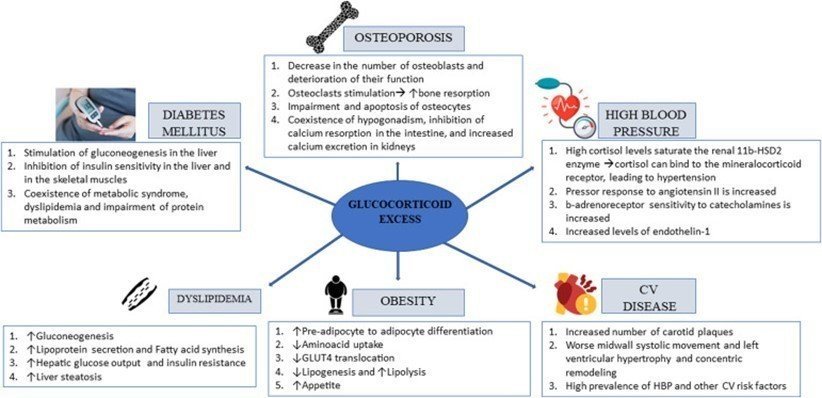The Dangers of Excess Cortisol: Understanding Hypercortisolism and Its Complications

INTRODUCTION
Cortisol, often referred to as the "stress hormone," plays a crucial role in our body's response to stress. Produced by the adrenal glands, cortisol helps regulate metabolism, blood sugar levels, and the immune response. However, like many things in life, balance is key. When cortisol levels become chronically elevated—a condition known as adrenal hypercortisolism or Cushing's syndrome (which can be mild or severe)—the consequences can be severe and wide-ranging. This article delves into why excessive cortisol is toxic to our body and explores the complications arising from hypercortisolism.
The Dangers of Excess Cortisol: Understanding Hypercortisolism and Its Complications
The Role of Cortisol in the Body
Before examining the toxic effects of excessive cortisol, it's essential to understand its normal functions. Cortisol helps the body manage stress by:
- Regulating Metabolism: Cortisol influences how the body converts carbohydrates, fats, and proteins into energy, ensuring a stable supply of glucose to the brain.
- Anti-inflammatory Effects: Cortisol helps modulate the immune response, preventing overactivity that could lead to inflammation.
- Blood Pressure Control: It helps maintain cardiovascular function by regulating blood pressure and maintaining blood vessel tone.
- Cognitive Functions: Cortisol affects mood, motivation, and fear, playing a role in the body's fight-or-flight response.

Figure 1. Summary of the toxic effects (complications) of too much cortisol.
From Araujo-Castro M, Pascual-Corrales E, Lamas C. Possible, probable, and certain hypercortisolism: A continuum in the risk of comorbidity. Ann Endocrinol (Paris). 2023 Apr;84(2):272-28
Read more about Cushing’s syndrome symptoms and MACS (Mild Autonomous Cortisol Secretion).
Complications of Hypercortisolism
1) Metabolic Disturbances
Excess cortisol disrupts normal metabolic processes, leading to a cascade of adverse effects:
- Obesity: Cortisol promotes the storage of fat, particularly in the abdominal region. This visceral fat is associated with a higher risk of cardiovascular disease and metabolic syndrome.
- Hyperglycemia: Cortisol increases blood sugar levels by promoting gluconeogenesis and reducing insulin sensitivity, which can lead to type 2 diabetes.
- Dyslipidemia: Elevated cortisol levels can increase the levels of triglycerides and LDL cholesterol, while decreasing HDL cholesterol, raising the risk of atherosclerosis.
2) Cardiovascular Complications
Chronic hypercortisolism significantly impacts cardiovascular health:
- Hypertension: Cortisol increases blood pressure by enhancing the vasoconstrictive effects of catecholamines and increasing sodium retention by the kidneys.
- Heart Disease: The combination of hypertension, diabetes, and dyslipidemia accelerates the development of coronary artery disease, increasing the risk of heart attacks and strokes.
3) Musculoskeletal Issues
Cortisol's catabolic effects on muscle and bone tissue lead to several musculoskeletal complications:
- Muscle Weakness: Prolonged exposure to high cortisol levels causes muscle protein breakdown, leading to muscle atrophy and weakness.
- Osteoporosis: Cortisol inhibits bone formation and accelerates bone resorption, increasing the risk of fractures.
4) Immune System Suppression
While cortisol's anti-inflammatory properties can be beneficial in the short term, chronic hypercortisolism suppresses the immune system, making the body more susceptible to infections. Additionally, wound healing is impaired, and there is an increased risk of developing opportunistic infections.
5) Neuropsychiatric Effects
Excess cortisol has profound effects on mental health and cognitive functions:
- Mood Disorders: High cortisol levels are associated with depression, anxiety, and irritability. Patients with Cushing's syndrome often experience mood swings and emotional instability.
- Cognitive Impairment: Cortisol affects the hippocampus, a brain region critical for memory and learning. Chronic hypercortisolism can lead to difficulties with concentration, memory loss, and cognitive decline.
6) Skin Changes
Cushing's syndrome manifests with several characteristic skin changes:
- Thinning Skin: Cortisol inhibits collagen synthesis, resulting in thin, fragile skin that bruises easily.
- Purple Striae: Stretch marks, especially on the abdomen, thighs, and breasts, are common due to the rapid accumulation of fat and thinning of the skin.
- Acne and Hirsutism: Increased androgen production, often seen in adrenal hypercortisolism, can lead to acne and excessive hair growth in women.
7) Reproductive Issues
Cortisol disrupts the normal functioning of the reproductive system:
- Menstrual Irregularities: Women with hypercortisolism may experience irregular menstrual cycles, amenorrhea, or infertility.
- Erectile Dysfunction: Men may suffer from reduced libido and erectile dysfunction due to the hormonal imbalances caused by excess cortisol.
Conclusion: While cortisol is essential for normal body function, its excess can be profoundly detrimental. Adrenal hypercortisolism, whether sporadic or familial, leads to a myriad of complications affecting nearly every system in the body. Early diagnosis and appropriate treatment are crucial in managing the condition and preventing long-term damage. By understanding the toxic effects of excess cortisol, we can better appreciate the importance of hormonal balance in maintaining overall health and well-being.
Read more here about Cushing’s syndrome treatment and surgery.
The bad news is that too much cortisol (adrenal hypercortisolism) is very toxic for our bodies. The good news is that it can be easily fixed and cured by an often 15-20 minutes operation. Dr. Carling is the world’s leading expert in adrenal gland surgery and curing adrenal hypercortisolism (Cushing’s syndrome). Without a doubt, the best operation for removing the adrenal tumor causing adrenal hypercortisolism and Cushing’s syndrome is the Mini Back Scope Adrenalectomy (MBSA). The operation can also be called the Mini Posterior Retroperitoneoscopic Adrenalectomy, because the operation is performed with very small scopes that go through the lower, outer back. The Mini Back Scope Adrenalectomy (MBSA) is the preferred technique in over 95% of adrenal surgery cases, and close to 100% in patients with adrenal hypercortisolism.
Additional Resources:
- Learn more about the Carling Adrenal Center
- Learn more about Dr. Tobias Carling
- Learn more about our sister surgeons at the Norman Parathyroid Center, Clayman Thyroid Center and Scarless Thyroid Surgery Center
- Learn more about the Hospital for Endocrine Surgery